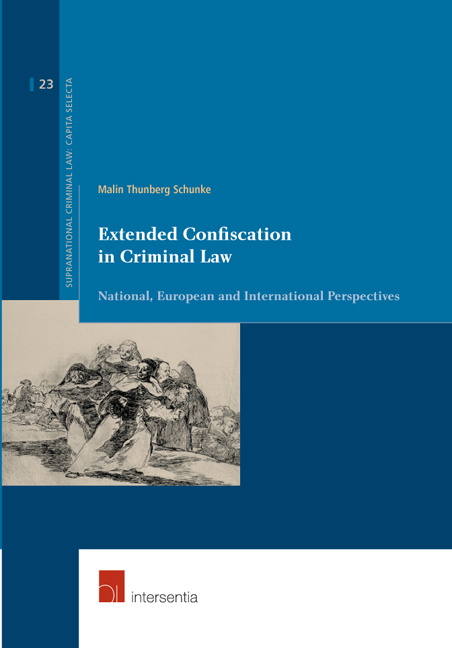Book contents
- Frontmatter
- Preface
- Contents
- Table of Cases
- List of Abbreviations
- Part I Introduction
- Part II Substantive Provisions on Extended Confiscation
- Part III The Legal Framework for International Cooperation
- Chapter 8 International Cooperation in the Area of Confiscation
- Chapter 9 Cross-Border Asset Tracing and Exchange of Information
- Chapter 10 International Cooperation in Order to Seize or Freeze Assets
- Chapter 11 International Cooperation in Order to Execute Final Confiscation Orders
- Chapter 12 The Proposal for a Regulation on Mutual Recognition
- Chapter 13 Final Remarks: “To Go for the Money” – But How?
- Bibliography
- Index
- About the Author
Chapter 13 - Final Remarks: “To Go for the Money” – But How?
from Part III - The Legal Framework for International Cooperation
Published online by Cambridge University Press: 11 October 2018
- Frontmatter
- Preface
- Contents
- Table of Cases
- List of Abbreviations
- Part I Introduction
- Part II Substantive Provisions on Extended Confiscation
- Part III The Legal Framework for International Cooperation
- Chapter 8 International Cooperation in the Area of Confiscation
- Chapter 9 Cross-Border Asset Tracing and Exchange of Information
- Chapter 10 International Cooperation in Order to Seize or Freeze Assets
- Chapter 11 International Cooperation in Order to Execute Final Confiscation Orders
- Chapter 12 The Proposal for a Regulation on Mutual Recognition
- Chapter 13 Final Remarks: “To Go for the Money” – But How?
- Bibliography
- Index
- About the Author
Summary
“Absent a clear and sound legal framework, asset recovery becomes, in a best-case scenario, arduous and, in a worst-case scenario, impossible”.
In this book, I have taken a comprehensive approach to the instrument of extended confiscation. The underlying idea has been that in order to set up an efficient strategy, one needs to address the different stages of the confiscation procedure as a whole and not view them separately. The international and national legislators have in recent years sought to justify more far-reaching measures with regard to the “low efficiency” of the confiscation regimes and the (anticipated) low figures of confiscated assets. Within the EU, wider powers on extended confiscation have been adopted under the argument that the harmonisation of the substantive provisions achieve more efficient national regimes and facilitate international cooperation. In order to assess the justifications for such assertions, this study has placed Directive 2014/42/EU in the broader context of the national and international legal framework and confiscation practice. The starting-point has been that any conclusions as to which legislative paths may be most efficient must be drawn on the basis of an understanding of how the system works as a whole.
So what is then the right path for the future? This study will be concluded with four general guidelines for the future development of extended confiscation. These are based on the findings of the comparative study and are intended to summarise this analysis.
(1) To avoid a disproportionate expansion of the powers on extended confiscation
There is reason to feel some concern about the expansion of the powers of extended confiscation. In fact, the instrument has expanded dramatically in the last few years. The trend both nationally and internationally has been towards more far-reaching legislation with a broadened range of triggering offences and a lowered standard of evidence. Even if extended confiscation was originally only applied in cases of organised crime and serious drug offences, there has been a successive shift towards the inclusion of all types of criminal offences.
Even if Directive 2014/42/EU abolished the previous link to organised criminality for extended confiscation, this criminality is often used in order to justify more extensive powers.
- Type
- Chapter
- Information
- Extended Confiscation in Criminal LawNational, European and International Perspectives, pp. 323 - 328Publisher: IntersentiaPrint publication year: 2017



